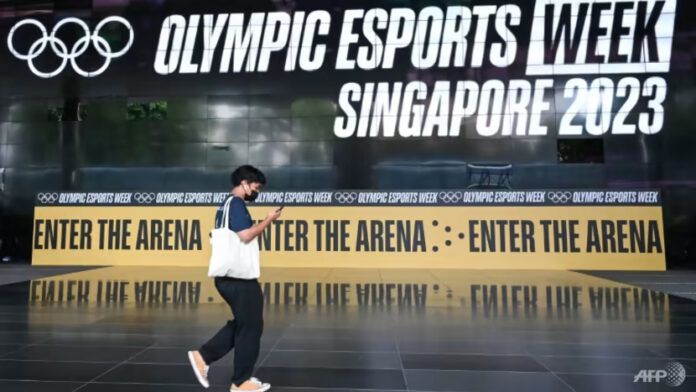SINGAPORE: When Singapore’s Culture, Community, and Youth Minister Edwin Tong revealed on Facebook late in 2022 that the country would host the first-ever Olympic Esports Week in 2023, he emphasized that “e-sports is more than just gaming.”
This garnered a comment from Marcus Tan, who eagle-eyed netizens would recognize as one of Singapore’s best e-sports players, better known by his moniker Revenant.
“E-sports have primarily always been about gaming in the past 15 plus years,” said the two-time World Cyber Games champion in real-time strategy title Warcraft 3
“To say that ‘e-sports is not just gaming’ and not include actual e-sports programmes seems to be overlooking the efforts of all the people in our nation who are immensely passionate about actual e-sports.”
The International Olympic Committee (IOC) announced a roster for Olympic Esports Week in March, which included largely virtual recreations of physical sports.
More than 110 participants from across the world will compete in simulated versions of archery, baseball, chess, cycling, dancing, sailing, tennis, taekwondo, and motorsport from Thursday (Jun 22) to Sunday at the Suntec convention center, with 17 representing Singapore.
Popular video games like Valorant, Dota, and Mobile Legends, which regularly headline big e-sports championships throughout the world, are nowhere to be seen.
The Olympic selection has raised eyebrows among both global and local e-sports personalities, with several echoing Mr Tan’s earlier remarks.
He told CNA on Wednesday that the event seemed “tone-deaf” and “not an accurate representation”.
A “DIFFERENT REALM”
In response to media inquiries about the lineup earlier this year, the IOC stated that the fundamental purpose of the Olympic agenda was to create virtual sports.
“This is why we have focused first on virtual and simulated sports games in the Olympic Esports Series,” it continued, referring to the competitions preceding the live finals at Olympic Esports Week in Singapore.
The IOC further said that the featured events must adhere to Olympic standards such as participation inclusivity and “avoidance of any personal violence.”
However, first sentiments around the world were dissatisfaction and disappointment.
Matt Woods, co-founder of London-based e-sports business AFK, told the Guardian newspaper that he was “a little embarrassed.”
“Instead of working with existing game publishers or well-established tournaments, it seems that the Olympic committee has instead decided to use this event as a marketing vehicle for brand-new, poorly thought out, unlicensed mobile games,” he said.
According to YouGov data, 80 percent of e-sports fans live in Asia Pacific, with the multiplayer combat arena game League of Legends (LoL) ranking as the most popular internationally and in Asia.
According to YouGov, none of the titles on display at Olympic Esports Week, including the archery-inspired Tic Tac Bow, cracked the top 25 list of most popular games in Asia.
“It’s a very questionable decision to use these games and call it the Olympic Esports Series,” said e-sports commentator Eugene Eu.
The 27-year-old, who has been live commentating since 2012, said the selection would be understandable if the IOC kept to its previous branding of the Olympic Virtual Series.
“That way, we can understand and draw some links from physical sports versus virtual sports,” said Mr Eu. “But to call it e-sports, that’s a completely different realm.”
Those in the community know that “this isn’t e-sports”, he added.


